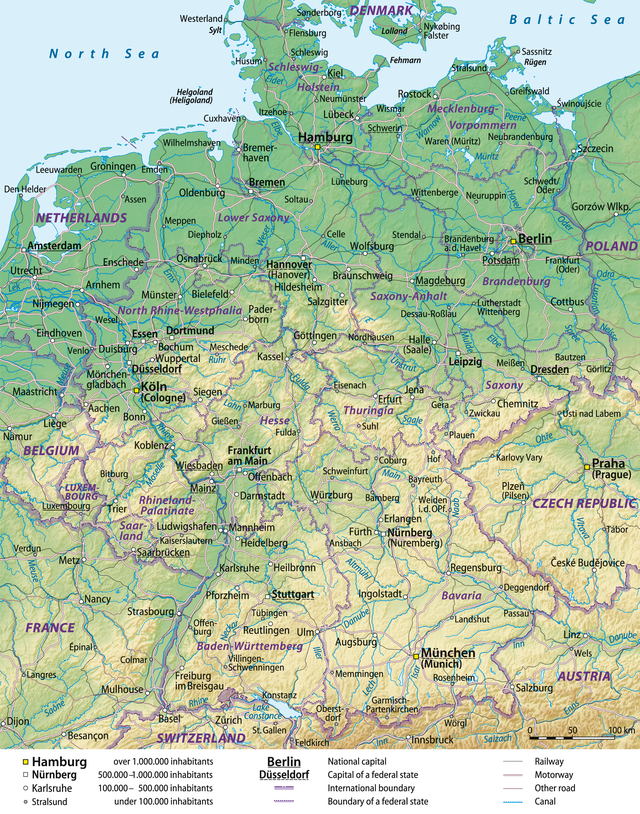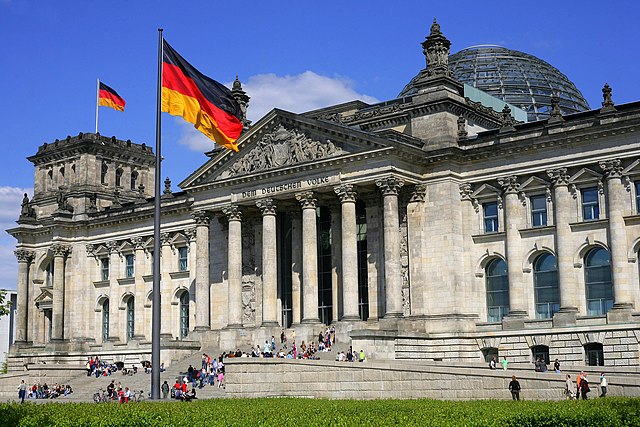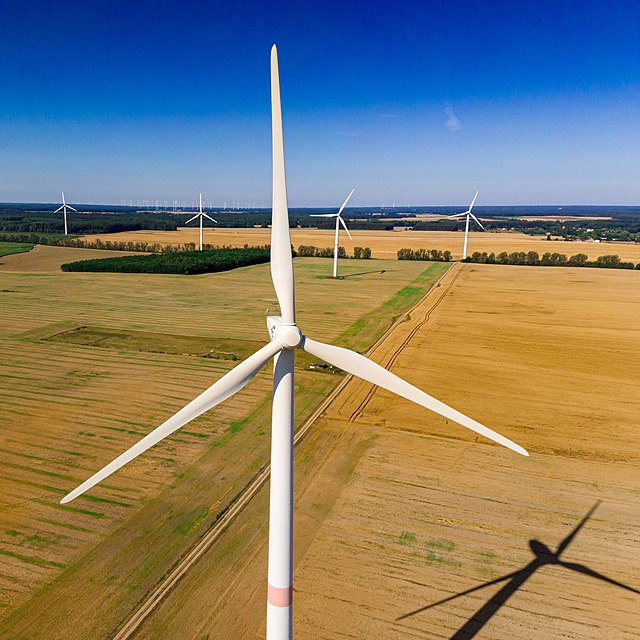Top Qs
Timeline
Chat
Perspective
Outline of Germany
Country in Western and Central Europe From Wikipedia, the free encyclopedia
Remove ads
The following outline is provided as an overview of and topical guide to Germany:


Germany – federal parliamentary republic in Western-Central Europe consisting of 16 constituent states (German: Bundesland), which retain limited sovereignty. Its capital and largest city is Berlin. With more than 80 million inhabitants, it is the most populous member state of the European Union (EU). Germany is a major economic and political power of the European continent and a historic leader in many cultural, scientific, and technological fields.
After losing World War I, Germany fell under the control of Adolf Hitler, who started World War II. After losing World War II, Germany was divided into East Germany and West Germany, each on opposite sides during the Cold War. In October 1990, after the Cold War ended, the country was reunified under Christian Democratic Union (CDU) chancellor Helmut Kohl. As of December 2023, Germany has grown to become the world's third-largest economy by nominal GDP.
Remove ads
General reference

- Pronunciation: /ˈdʒɜːrməni/ ⓘ; German: Deutschland [ˈdɔʏtʃlant] (officially the Federal Republic of Germany; German: Bundesrepublik Deutschland [ˈbʊndəsʁepuˌbliːk ˈdɔʏtʃlant] ⓘ)
- Common English country name: Germany
- Official English country name: The Federal Republic of Germany
- Common endonym(s): Deutschland
- Official endonym(s): Bundesrepublik Deutschland
- Adjectival(s): German
- Demonym(s): Germans
- Etymology: Name of Germany
- International rankings of Germany
- ISO country codes: DE, DEU, 276
- ISO region codes: See ISO 3166-2:DE
- Internet country code top-level domain: .de
Remove ads
Geography of Germany
Summarize
Perspective

Germany is bordered to the north by the North Sea, Denmark, and the Baltic Sea; to the east by Poland and the Czech Republic; to the south by Austria and Switzerland; and to the west by France, Luxembourg, Belgium, and the Netherlands. The territory of Germany covers 357,021 square kilometres (137,847 sq mi) and is influenced by a temperate seasonal climate.
- Germany is a:
- Location:
- Northern Hemisphere and Eastern Hemisphere
- Time in Germany
- Extreme points of Germany (major towns):[1]
- North: Westerland (on the island of Sylt at the Danish border)
- South: Oberstdorf, town at Austria[2]
- East: Goerlitz, town at Poland
- West: Aachen, town at Belgium & the Netherlands
- High: Zugspitze 2,962 m (9,718 ft)
- Low: Neuendorf bei Wilster −3.5 m (−11 ft)
- Coastline: 2,389 km (1,484 mi)
- Population of Germany: 82,217,800 people (2007 estimate) – 14th most populous country
- Area of Germany: 357,021 km2 (137,847 sq mi) – 63rd largest country
- Atlas of Germany
- List of cities and towns in Germany
Neighbours of Germany
Land boundaries: 3,621 km (2,250 mi)
 Austria 784 km (487 mi)
Austria 784 km (487 mi) Czech Republic 646 km (401 mi)
Czech Republic 646 km (401 mi) Netherlands 577 km (359 mi)
Netherlands 577 km (359 mi) Poland 456 km (283 mi)
Poland 456 km (283 mi) France 451 km (280 mi)
France 451 km (280 mi) Switzerland 334 km (208 mi)
Switzerland 334 km (208 mi) Belgium 167 km (104 mi)
Belgium 167 km (104 mi) Luxembourg 138 km (86 mi)
Luxembourg 138 km (86 mi) Denmark 68 km (42 mi)
Denmark 68 km (42 mi)
Environment of Germany

- Climate of Germany
- Green building in Germany
- Renewable energy in Germany
- Geology of Germany
- National parks of Germany
- Protected areas of Germany
- Wildlife of Germany
Geographic features of Germany
Administrative divisions of Germany
States of Germany
Germany is composed of 16 constituent states, called Bundesländer (plural form; Bundesland singularly; see map on the right).
Further subdivisions
- Some German states are subdivided into administrative regions, called Regierungsbezirke.
- Germany as a whole is further composed of approx. 400 districts, separated into:
- "Rural" districts (Landkreise or Kreise) and
- "Urban" districts (Kreisfreie Städte or Stadtkreise)
- Cities of Germany
- Municipalities of Germany
Demography of Germany
Demographics of Germany With over 82 million inhabitants, it comprises the largest population among the member states of the European Union and is home to the third-highest number of international migrants. See more at Immigration to Germany.
Remove ads
Government and politics of Germany
Summarize
Perspective
- Form of government: federal parliamentary representative democratic republic
- Capital of Germany: Berlin
- Former Capital of West Germany and later seat of government of the reunified Federal Republic: Bonn
- Federal budget of Germany
- Elections in Germany
- Far-right politics in Germany
- Federalism in Germany
- Political parties in Germany
- Political scandals of Germany
- Security issues in Germany
- Taxation in Germany
Branches of the government of Germany
Executive branch of the government of Germany
Legislative branch of the government of Germany
Judicial branch of the government of Germany
Foreign relations of Germany
- List of diplomatic missions in Germany
- List of diplomatic missions of Germany
- Embassy of Germany, Abuja
- Embassy of Germany, Bangkok
- Embassy of Germany, Brasília
- Embassy of Germany, Budapest
- Embassy of Germany, Canberra
- Embassy of Germany, Chișinău
- Embassy of Germany, Kyiv
- Embassy of Germany, London
- Embassy of Germany, Moscow
- Embassy of Germany, Ottawa
- Embassy of Germany, Prague
- Embassy of Germany, Saint Petersburg
- Embassy of Germany, Tel Aviv
- Embassy of Germany, Washington, D.C.
- Embassy of Germany, Wellington
International organization membership
The Federal Republic of Germany is a member of:[3]
Law and order in Germany
- Laws in Germany
- Crime in Germany
- Human rights in Germany
- Law enforcement in Germany
- National law enforcement agencies
- Regional law enforcement agencies
- Landespolizei – are operated by individual German states and are responsible for the bulk of police work in Germany
- Landespolizei forces are divided into the following operational sections:
- Schutzpolizei – ('Schupo') The uniformed police officers who patrol the streets, respond to emergency calls, do traffic policing etc.
- Kriminalpolizei – ('Kripo') The plain clothes detective branch of the State police, responsible for investigations. For instance, if a car is broken into, the Schupo will respond, secure the car, notify the owner etc., and then hand the case over to Kripo for investigation.
- Einsatzhundertschaften (EHU) / Bereitschaftspolizei (BePo) – Uniformed part of the LaPo that is used when manpower is required, for example during political demonstrations.
- Landeskriminalamt (LKA) – The State Investigation Bureau is directly subordinate to the state ministry of the interior, supervises police operations aimed at preventing and investigating criminal offences, and coordinates investigations involving more than one Präsidium.
- Wasserschutzpolizei (WSP) – The river police for patrolling rivers, lakes and harbours.
- Spezialeinsatzkommando (SEK) – The SWAT teams of the German state police.
- Autobahnpolizei – The highway patrol or motorway police in Germany.
Military of Germany
- Command
- Commander-in-chief:
- Bundeswehr
- Army of Germany: Heer
- Navy of Germany: Marine
- Air force of Germany: Luftwaffe
- Special forces of Germany: Kommando Spezialkräfte
- Military history of Germany
- Military ranks of Germany
Local government in Germany
Remove ads
History of Germany
Summarize
Perspective
History of Germany, by period
Years in Germany
- 1871 • 1872 • 1873 • 1874 • 1875 • 1876 • 1877 • 1878 • 1879 • 1880 • 1881 • 1882 • 1883 • 1884 • 1885 • 1886 • 1887 • 1888 • 1889 • 1890 • 1891 • 1892 • 1893 • 1894 • 1895 • 1896 • 1897 • 1898 • 1899 • 1900 • 1901 • 1902 • 1903 • 1904 • 1905 • 1906 • 1907 • 1908 • 1909 • 1911 • 1912 • 1913 • 1914 • 1915 • 1916 • 1917 • 1918 • 1919 • 1920 • 1921 • 1922 • 1923 • 1924 • 1925 • 1926 • 1927 • 1928 • 1929 • 1930 • 1931 • 1932 • 1933 • 1934 • 1935 • 1936 • 1937 • 1938 • 1939 • 1940 • 1941 • 1942 • 1943 • 1944 • 1945 • 1946 • 1947 • 1948 • 1949 • 1950 • 1951 • 1952 • 1953 • 1954 • 1955 • 1956 • 1957 • 1958 • 1959 • 1960 • 1961 • 1962 • 1963 • 1964 • 1965 • 1966 • 1967 • 1968 • 1969 • 1970 • 1971 • 1972 • 1973 • 1974 • 1975 • 1976 • 1977 • 1978 • 1979 • 1980 • 1981 • 1982 • 1983 • 1984 • 1985 • 1986 • 1987 • 1988 • 1989 • 1990 • 1991 • 1992 • 1993 • 1994 • 1995 • 1996 • 1997 • 1998 • 1999 • 2000 • 2001 • 2002 • 2003 • 2004 • 2005 • 2006 • 2007 • 2008 • 2009 • 2010 • 2011 • 2012 • 2013 • 2014 • 2015 • 2016 • 2017 • 2018 • 2019
History of Germany, by region
History of Germany, by subject
Remove ads
Culture of Germany
Summarize
Perspective



- Architecture of Germany
- Cuisine of Germany
- Cultural icons of Germany
- Festivals in Germany
- German humour
- Languages of Germany
- Media in Germany
- Museums in Germany
- National symbols of Germany
- Philosophy in Germany
- Prostitution in Germany
- Public holidays in Germany
- Records of Germany
- Scouting and Guiding in Germany
- World Heritage Sites in Germany
Art in Germany
- Art in Germany
- Cinema of Germany
- Cuisine of Germany
- Fashion of Germany
- Literature of Germany
- Made in Germany
Music of Germany

People of Germany
- Afghans in Germany
- Ahmadiyya in Germany
- Albanians in Germany
- Americans in Germany
- Arabs in Germany
- Armenians in Germany
- Asians in Germany
- Assyrians in Germany
- Azerbaijanis in Germany
- Brazilians in Germany
- Bulgarians in Germany
- Chinese people in Germany
- Croatians in Germany
- Filipinos in Germany
- Georgians in Germany
- Greeks in Germany
- Hungarians in Germany
- Indians in Germany
- Iranians in Germany
- Iraqis in Germany
- Islamic Community of Germany
- Italians in Germany
- Kurds in Germany
- Lebanese people in Germany
- List of Lebanese people in Germany
- Macedonians in Germany
- Russians in Germany
- Serbs in Germany
- Tjaskers in Germany
- Turks in Germany
- Ukrainians in Germany
- Vietnamese people in Germany
- Yazidis in Germany
Religion and belief systems in Germany

- Irreligion in Germany
- Religion in Germany
- Freedom of religion in Germany
- Religions in Germany
Sports in Germany

- American Football Association of Germany
- Athletics in Germany
- Auto racing in Germany
- Basketball in Germany
- Bodybuilding in Germany
- Cricket in Germany
- Football in Germany
- Australian rules football in Germany
- Football records in Germany
- Footballer of the Year (Germany)
- Foreign football players in Germany
- List of American football teams in Germany
- List of Germany Davis Cup team representatives
- List of Germany men's international footballers
- List of Germany international footballers 1908–1942
- List of Germany women's international footballers
- List of football clubs in Germany
- List of football clubs in Germany by major honours won
- List of football stadiums in Germany
- Women's football in Germany
- Germany at the Olympics
- German records in athletics
- Ice hockey in Germany
- Roller derby in Germany
- Rugby in Germany
- Sports broadcasting contracts in Germany
Remove ads
Economy and infrastructure of Germany
Summarize
Perspective
Germany was the third largest exporter in 2017. In absolute terms, Germany allocates the second biggest annual budget of development aid in the world,[4] while its military expenditure ranked sixth.[5] The country has developed a high standard of living and established a comprehensive system of social security.
- Economic rank, by nominal GDP (2007): 4th (fourth)
- Agriculture in Germany
- Central banks
- Communications in Germany
- Companies of Germany

- Currency of Germany: Euro (see also: Euro topics)
- Economic history of Germany
- Mining in Germany
- Mittelstand
- Stock exchange: Frankfurt Stock Exchange
- Tourism in Germany
- Transport in Germany
- Water supply and sanitation in Germany
- Wirtschaftswunder
Energy in Germany

Windkraftanlage bei Breydin OT Trampe, Brandenburg;
Remove ads
Education in Germany
Health in Germany
See also
- Index of Germany-related articles
- List of international rankings
- Member state of the European Union
- Member state of the Group of Twenty Finance Ministers and Central Bank Governors
- Member state of the North Atlantic Treaty Organization
- Member state of the United Nations
- Outline of Europe
- Outline of geography
References
External links
Wikiwand - on
Seamless Wikipedia browsing. On steroids.
Remove ads



